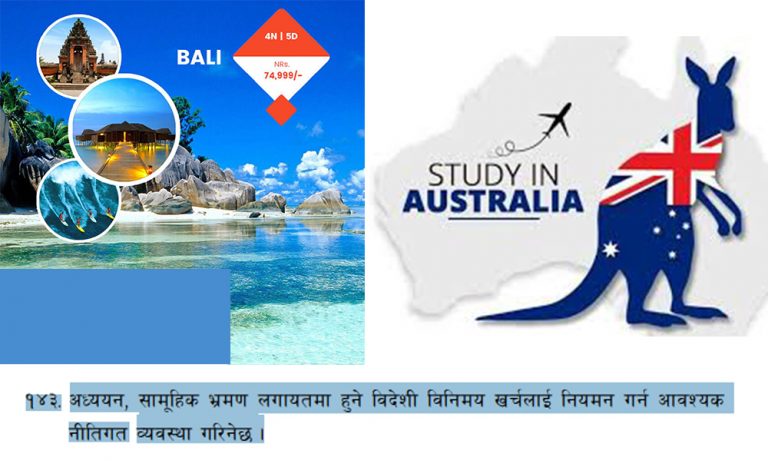
Nepal Rastra Bank (Central Bank of Nepal) in its recently released Monetary Policy for the fiscal year 2076 – 2077 ‘envisions maintaining stability in the price, foreign exchange and the entire financial sector’. While doing so, they have taken several ‘protectionist’ moves which could prove detrimental towards large sections of an engaging economy.
For example, section 143 of the monetary policy states that ‘provisions to control expenditure by Nepalese on foreign universities and group tourism expeditions will be initiated’. While the exact rules are yet to be announced – the most likely decision will probably be ‘capping exchange amounts’.
The Rastra Bank posted one of the highest trade-deficit in the past financial year, and is making stringent moves to protect its foreign reserves. The government wants Nepalese to travel domestically and students to not attend ‘expensive universities’ abroad. However, provisions for both are not enough – the domestic tourism industry cannot sustain such huge movement, and Nepalese Universities have a long way to go before becoming ‘appealing’ to Nepalese students.
According to Rastra Bank, Nepalis spent Rs. 41 billion on education and Rs. 20 billion on foreign travel in the past fiscal year – the numbers are substantial contributors towards our depleting foreign reserve. The government is feeling the pressure because trade deficits are surging as well, adding extra pressure on the Balance of Payments – therefore pushing policies which are ‘protective’ in nature.
According to reports, our foreign reserves are rapidly shrinking – for example, in 2016, our foreign exchange could sustain above a year worth of imports, whereas in 2019, our foreign reserve can only sustain up to 6 months of payments. Nepal, being a non-manufacturing company, is heavily reliant on imports – therefore requires to maintain enough foreign exchange to facilitate payments.
The need for alarm is therefore clear – but are ‘protectionist’ moves the solution? For example, Nepal probably needs to spend more time and money on promoting Nepal as a destination for foreign travellers to surpass the money being spent on Nepalis while going abroad. In the context of education, Nepal probably needs to make its universities as appealing as foreign universities. If a Nepali chooses Nepal out of free will, Nepal will have won.




